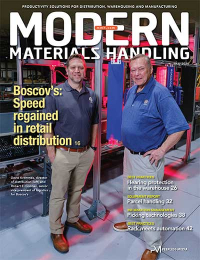TNT NV to ‘de-merge’ Express and Mail units
Company plans to sell Express business and focus on Mail operations; transaction expected to be completed by May 2011
Latest Material Handling News
Netherlands-based TNT NV, a provider of mail and couriers services and the fourth largest global parcel operator, said it plans to “demerge” operations by separating its Express and Mail operations into two independent companies.
Company officials said that the main reasons for an internal separation, which will take effect on January 1, 2011, are the increasingly divergent strategic profiles of the two units and the limited existing synergies between them.
As a result of this initiative, TNT NV will demerge Express and only focus on Mail activities, and will retain a 29.9 percent financial stake to cover separation agreements, which will be returned to shareholders as soon as possible, according to the company. And the demerger will be voted on by TNT shareholders next May.
The company also said that TNT NV CEO Peter Bakker will stay on board in his position until the demerger is complete and will subsequently resign thereafter. A Wall Street Journal report said that Bakker has been criticized by observers for being too slow to separate the company’s mail and express operations.
“Mail is faced with a continuously declining mail market in the Netherlands and has to focus on sustaining solid cash flows and operational efficiency,” said the officials. “Express’ priorities are to grow its existing strong European networks, to continue to grow the intercontinental business from and to Europe into adjacent markets and to secure contributions from its existing strong positions in China, South America, and India.”
Earlier this year, various media reports suggested that TNT was considering spinning off its Mail business by the end of 2010, although with this week’s news the opposite has happened.
CEO Bakker said in an April Financial Times report that partnerships could be one way of strengthening the Mail business or make it a part of European mail consolidation by potentially joining forces with competitors or consider a separate listing for the Mail business.
At this time, industry analysts floated the idea that industry bellwethers UPS or FedEx could make a play for TNT’s Mail business, given the geographical strengths and weaknesses of each company.
A research note from Stifel Nicolaus analyst David Ross said that FedEx commented at its recent analyst meeting that it has plenty of organic growth ahead in Europe and internationally and making a large purchase in their view is unnecessary. But Ross pointed out that “FedEx has the smallest market share of the big 4 [global parcel operators] and would benefit the most from the improved coverage.”
Ross also explained that UPS has denied interest in acquiring TNT’s Express business recently, adding that UPS already has a very strong European footprint—with roughly 50 percent of its International Package business Europe-related—and he noted that because of that fact it would make even less strategic sense for UPS to acquire TNT.
“I would say it is a mistake for either UPS or FedEx to buy [TNT],” said Jerry Hempstead, principal of Hempstead Consulting. “It would just be the same mistake DHL made when they acquired Airborne. But UPS and FedEx are in this express and ground space already, and I can just see them not being able to resist the urge to get their brand on everything and forget why they are in business in the first place. And I can’t see the European Union letting DPWN-DHL buy TNT, because it then creates more of a monopoly in Europe.”
What’s more, Hempstead said DHL may not be inclined to make another major acquisition in the express space after the major losses it incurred in the U.S. with Airborne. He said that they are only now seeing their financials return to normal, coupled with FedEx and UPS emerging as the beneficiaries of taking Airborne out of the game.
Doug Caldwell, president of ParcelResearch, said TNT likely found it easier to sell off Express than to sell off its Mail division.
“Potential purchase buyers of the Express division, which obviously include FedEx and UPS, are not going to want the Mail division as it is a very different business model at this point,” said Caldwell. “It makes sense to separate these two companies. As far as changes to Express, it is not likely there will be many in the short-term, and I don’t think shippers will see a lot of changes as a result of this announcement.”

Article Topics
News & Resources
Latest in Materials Handling
Boscov’s: Speed regained in retail distribution Women in Manufacturing Association to offer 4th annual Moms in MFG Conference Fox Robotics and KION NA announce strategic partnership Ergonomics Update: Hearing protection in the warehouse Parcel handling on the move An inside look at picking technologies April Services PMI contracts following 15 months of growth, reports ISM More Materials HandlingAbout the Author
Subscribe to Materials Handling Magazine

Find out what the world's most innovative companies are doing to improve productivity in their plants and distribution centers.
Start your FREE subscription today.
May 2024 Modern Materials Handling

Latest Resources










